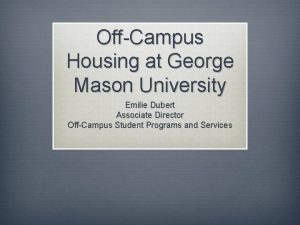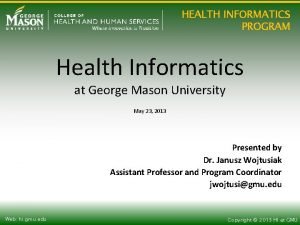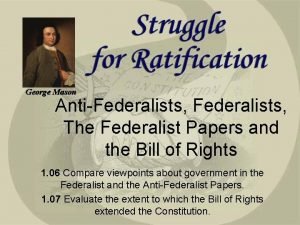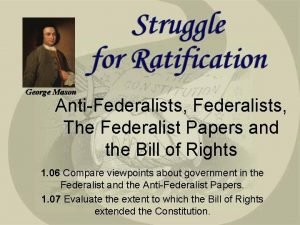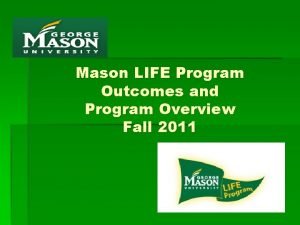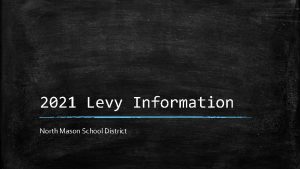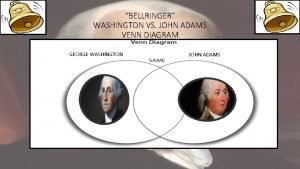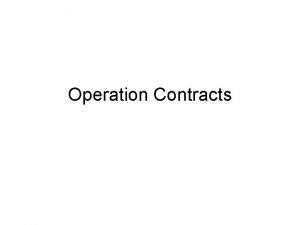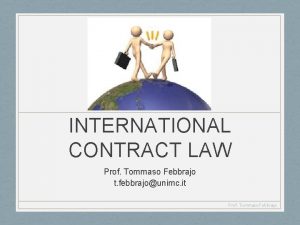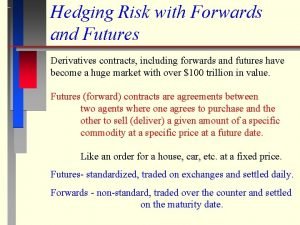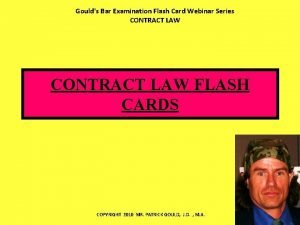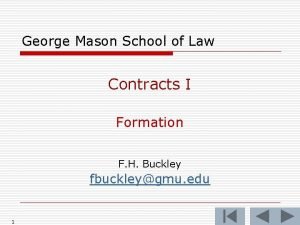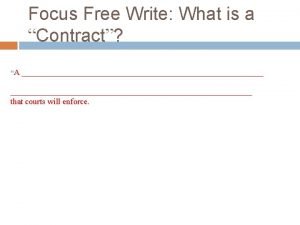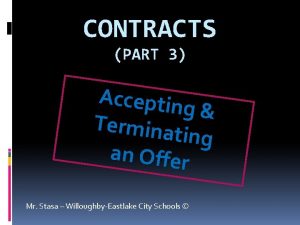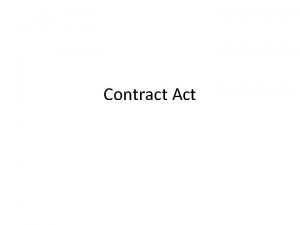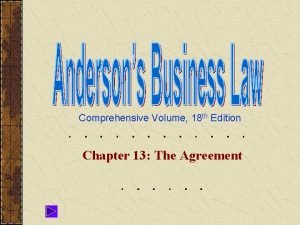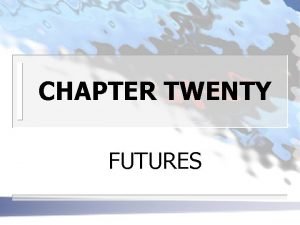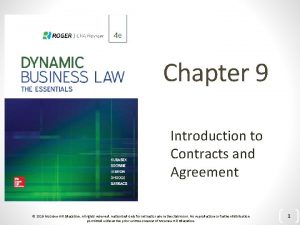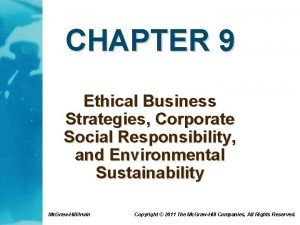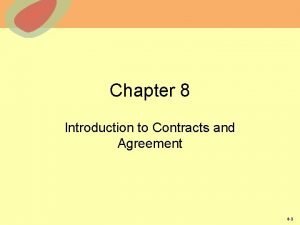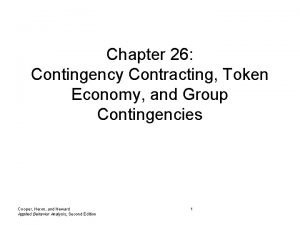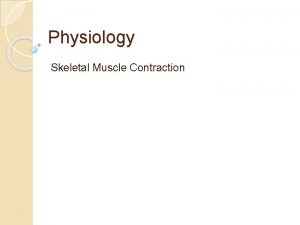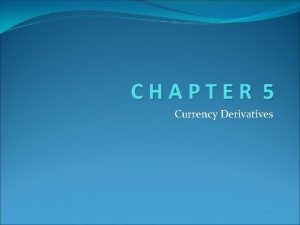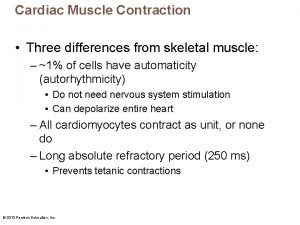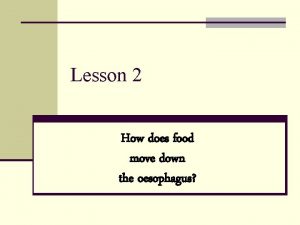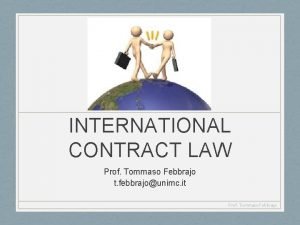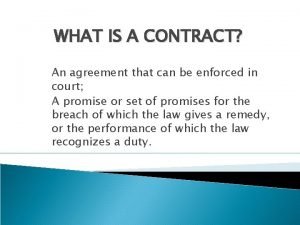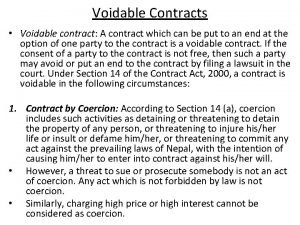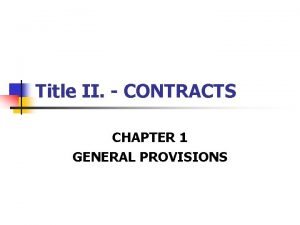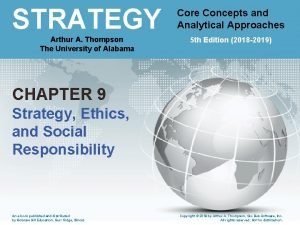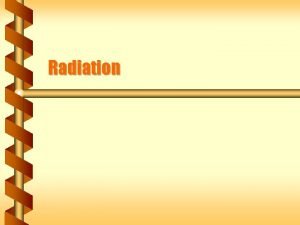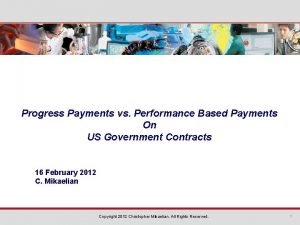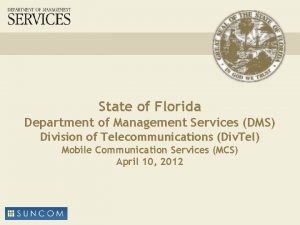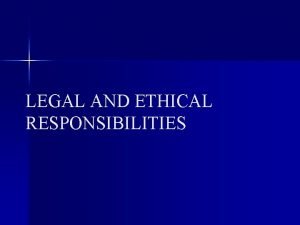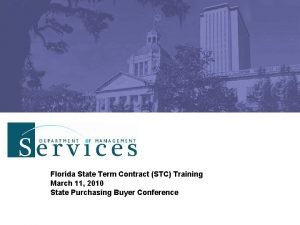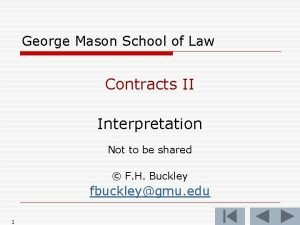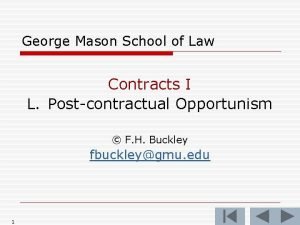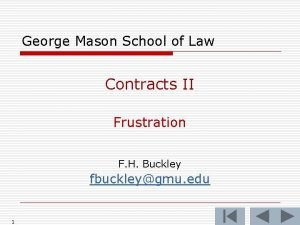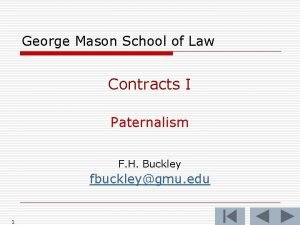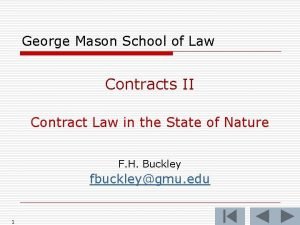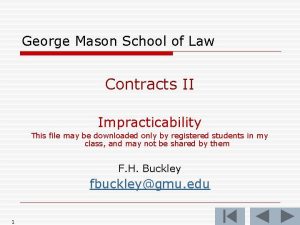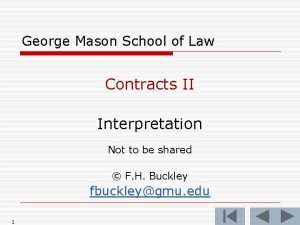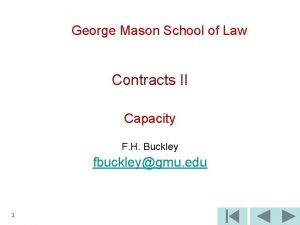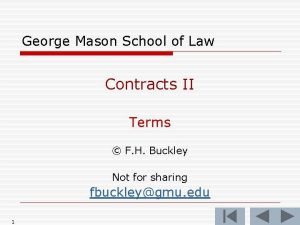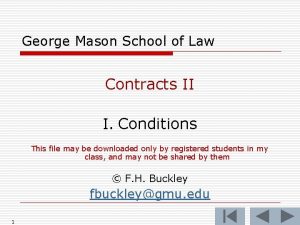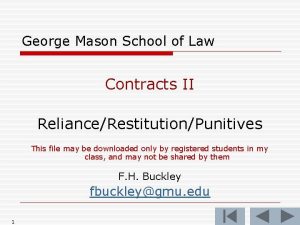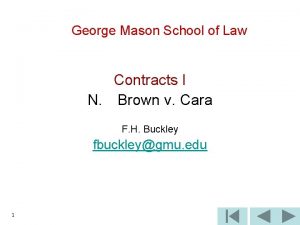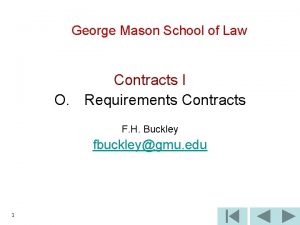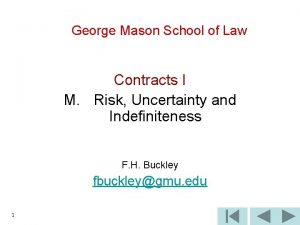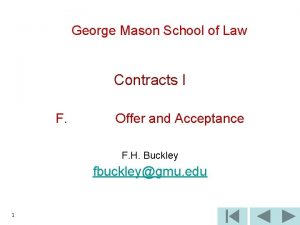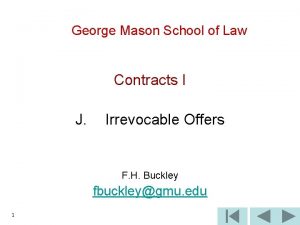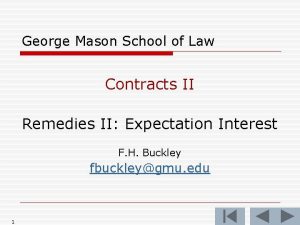George Mason School of Law Contracts I J














































































- Slides: 78

George Mason School of Law Contracts I J. Promissory Estoppel F. H. Buckley fbuckley@gmu. edu 1

Restatement § 90(1) o A promise which: the promisor should reasonably expect to induce action or forbearance on the part of the promisee or a third person n and which does induce such action or forbearance n is binding if injustice can be avoided only by enforcement of the promise. The remedy granted for breach may be limited as justice requires. n 2

What we’ll look at o An ideological battle? o Varieties of Promissory Estoppel o The Material Benefits Rule 3

Estoppel: An Ideological Battle? Oliver Wendell Holmes 4 Samuel Williston Arthur Corbin

Estoppel: An Ideological Battle? Grant Gilmore, The Death of Contract (1974) 5

Varieties of Promissory Estoppel o o 6 Chartable Subscriptions Family Promises Employment Contracts Promises to Insure

Charitable Subscriptions o I promise you $10, 000 but renege. o Is my promise enforceable? 7

Charitable Subscriptions o I promise you $10, 000 but renege. Is my promise enforceable? n On the basis of the promise, you’ve bought a car? Enforceable? 8

Restatement § 90(1) o A promise which the promisor should reasonably expect to induce action or forbearance on the part of the promisee or a third person and which does induce such action or forbearance is binding if injustice can be avoided only by enforcement of the promise. The remedy granted for breach may be limited as justice requires. 9

Charitable Subscriptions o You and I meet and agree that we will both donate $5, 000 to a third party. o I give. You don’t. Are you liable? 10

What would action or forbearance look like? n I pledge $500, 000 to a college which promises to name a scholarship after me. 11

Charitable Subscriptions o Cardozo in Allegheny College p. 157 n Where was the promise? 12 Allegheny College

Charitable Subscriptions o Does it matter that the college was a 501(c)3? 13

Charitable Subscriptions o What about Restatement § 90(2) n A charitable subscription or a marriage settlement is binding under 90(1) without proof that the promise induced action or forbearance 14

Charitable Subscriptions o What about Restatement § 90(2) n A charitable subscription or a marriage settlement is binding under 90(1) without proof that the promise induced action or forbearance n Suppose the gift is for general purposes? Just how would one show reliance? 15

Charitable Subscriptions o Is Restatement § 90(2) inconsistent with De. Leo at 156? 16

De. Leo o The De. Leo Memorial broom closet n What did you expect for $25 K? 17

Charitable Subscriptions o Is Restatement § 90(2) inconsistent with De. Leo at 156? n How might the absence of a writing be relevant n Why “no injustice”? 18

Charitable Subscriptions o Is Restatement § 90(2) inconsistent with De. Leo at 156? n Why “no injustice”? n Fiduciary relationships o Priest: penitent o Lawyer: client o Trustee: beneficiary 19

Distinguish four kinds of duties o Legal duties you should perform even if you don’t promise (e. g. , pay taxes) 20

Distinguish four kinds of duties o Legal duties you should perform even if you don’t promise (e. g. , pay taxes) o Things you should do because you promised to do so, and provided consideration (obligations) 21

Distinguish four kinds of duties o Legal duties you should perform even if you don’t promise (e. g. , pay taxes) o Things you should do because you promised to do so, and provided consideration o Things you should do because you promised, and the promisee has relied, and 90(1) is triggered 22

Distinguish four kinds of duties o Legal duties you should perform even if you don’t promise (e. g. , pay taxes) o Things you should do because you promised to do so, and provided consideration o Things you should do because you promised, and the promisee has relied, and 90(1) is triggered o Things you should do because you ought to do them and have promised to do so, notwithstanding the absence of consideration or promisee reliance 23

The fourth kind: Restatement § 90(2) o A charitable subscription or a marriage settlement is binding under 90(1) without proof that the promise induced action or forbearance 24

Charitable Subscriptions o Why do you think most courts refuse to adopt Restatement § 90(2)? 25

Charitable Subscriptions o Which rule produces more charitable giving? 26

Charitable Subscriptions o Why so few such cases? 27

Family Promises o Do they deserve special consideration? n If so, which way does this cut? 28

Haase v. Cardoza p. 164 o Was the promise supported by consideration? 29

Haase v. Cardoza p. 164 o Was the promise supported by consideration? o Did Alice really stiff Rose and Loretta? 30

Haase v. Cardoza o Was the promise supported by consideration? o What about reliance? A change of position? 31

Haase v. Cardoza o Was the promise supported by consideration? o What about reliance? A change of position? o What about the equities? 32

Ricketts v. Scothorn p. 166 33

Ricketts v. Scothorn o Was consideration given by Katie for the promise? 34

Ricketts v. Scothorn o Was consideration given by Katie for the promise? n No promise on the part of the plaintiff to do or refrain from doing anything 35

Ricketts v. Scothorn o Why did the grandfather renege (even before he died)? 36

Ricketts v. Scothorn o Why did the grandfather renege (even before he died)? n “If he could sell his farm…” n Let Katie work for Funke and Ogden as a bookkeeper 37

Ricketts v. Scothorn o Was there reliance by Scothorn? 38

Ricketts v. Scothorn o Was there reliance by Scothorn? o “Having intentionally influenced the plaintiff to alter her position for the worse … it would be grossly inequitable to permit … the executor … to resist payment” 39

Family promises o Why might a promisor want to incur legal liability? 40

Family promises o Why might a promisor want to incur legal liability? o And why might he not want to do so? 41

Family promises o If we enforce them all, do we make promisees better off? 42

George Mason School of Law Contracts I J. Promissory Estoppel F. H. Buckley fbuckley@gmu. edu 43

Varieties of Promissory Estoppel o o 44 Chartable Subscriptions Family Promises Employment Contracts Promises to Insure

The Employment Context o Feinberg v. Pfeiffer p. 173 n What was the promise and why was it made? 45

The Employment Context o Feinberg v. Pfeiffer p. 173 n What was the promise and why was it made? n Was there consideration? 46

The Employment Context o Feinberg v. Pfeiffer p. 173 n What was the promise and why was it made? n Was there consideration? n Cf. Restatement § 86 on past consideration 47

Past Consideration Doctrine o Restatement 86(1)(1) A promise made in recognition of a benefit previously received by the promisor from the promisee is binding to the extent necessary to prevent injustice. o (2) A promise is not binding under Subsection (1): (a)if the promisee conferred the benefit as a gift or for other reasons the promisor has not been unjustly enriched; or (b) to the extent that its value is disproportionate to the benefit. 48

The Employment Context o Feinberg v. Pfeiffer n What was the promise and why was it made? n What was the reliance? o What would count as reliance? 49

The Employment Context o Feinberg v. Pfeiffer n What was the promise and why was it made? n What was the reliance? o How old was she in 1947? o And for how much longer did she work for Pfeiffer? 50

The Employment Context o Feinberg v. Pfeiffer n What was the promise and why was it made? n What was the reliance? o What if she had quit because she was too ill to work? 51

The Employment Context o Feinberg v. Pfeiffer n What about the equities of the case? 52

Why a different result in Hayes? P. 177 53

Why a different result in Hayes? o Feinberg retired after the promise; Hayes decided to retire before the promise, and retired a week after it was made 54

Why a different result in Hayes? o Feinberg retired after the promise; Hayes decided to retire before the promise, and retired a week after it was made o No formal provision, no board resolution. (So? ) 55

Why a different result in Hayes? o Did the promisors intend to assume legal liability in this case? In Feinberg? 56

Promises to insure You DID insure, didn’t you Rhett? 57

The Typical Case o Spiegel at 190 Insurer: Met Life Agent: Levy Insured: Spiegel 58

Geremia at 186 o Did the lender promise to insure the car? 59

Geremia at 186 o Did the lender promise to insure the car? n Where was the evidence? 60

Geremia at 185 o Did the lender promise to insure the car? o Cf. Restatement 90, comment e: “applied with caution” 61

Distinguish four kinds of duties o Things you should do even if you don’t promise (e. g. , pay taxes) o Things you should do because you promised to do so, and provided consideration o Things you should do because you promised, and the promisee has relied, and 90(1) is triggered o Things you should do because you ought to do them and have promised to do so, notwithstanding the absence of consideration or promisee reliance 62

The Material Benefits Rule o Webb v. Mc. Gowin p. 193 W. T. Smith Lumber Co. , Chapman AL 63

The Material Benefits Rule o Webb v. Mc. Gowin J. Greeley Mc. Gowin 64

The Material Benefits Rule o Webb v. Mc. Gowin n Treat this as a contracts case. Is there a consideration problem? 65

The Material Benefits Rule o Webb v. Mc. Gowin n Treat this as a contracts case. Is there a consideration problem? o The past consideration rule 66

The Material Benefits Rule o Webb v. Mc. Gowin n Treat this as a promissory estoppel issue. Was there promisee reliance here? 67

The Material Benefits Rule o Webb v. Mc. Gowin n So what’s the basis for a remedy? 68

The Material Benefits Rule o Webb v. Mc. Gowin n Recall Bailey v. West o Is Webb a suitable case for relief in quasi-contract? o If so, why? 69

The Material Benefits Rule o Webb v. Mc. Gowin o Describe the hypothetical bargain, if we could have frozen time before Webb diverted the block? 70

The Material Benefits Rule o Webb v. Mc. Gowin o What did the promise add? 71

Restatement § 86 Promise for Benefit Received o § 86(1) A promise made in recognition of a benefit previously received by the promisor from the promisee is binding to the extent necessary to prevent injustice. o § 86(2) A promise is not binding under Subsection (1) n (a) if the promisee conferred the benefit as a gift or for other reasons the promisor has not been unjustly enriched; or n (b) to the extent that its value is disproportionate to the benefit 72

The Material Benefits Rule o Webb v. Mc. Gowin n Can you distinguish it from Mills v. Wyman: p. 193? 73

The Material Benefits Rule o Webb v. Mc. Gowin n Can you distinguish it from Mills v. Wyman? n What about Boothe v. Fitzpatrick (p. 199) 74

The Material Benefits Rule o Why do you think this is called the “material” benefits rule? 75

Restatement § 86 Promise for Benefit Received o § 86(1) A promise made in recognition of a benefit previously received by the promisor from the promisee is binding to the extent necessary to prevent injustice. o (2) A promise is not binding under Subsection (1) n (a) if the promisee conferred the benefit as a gift or for other reasons the promisor has not been unjustly enriched; or n (b) to the extent that its value is disproportionate to the benefit 76

Pitching ideas: The double trust problem o Desny v. Billy Wilder at 194 77

Pitching Ideas o Pitching ideas: Desny v. Wilder n Why is this a past consideration rule problem? 78
 Shirley ardell mason
Shirley ardell mason George mason university off campus housing
George mason university off campus housing Mason high motivation
Mason high motivation Gmu hap
Gmu hap George mason quotes anti federalist
George mason quotes anti federalist Gmu registration
Gmu registration George mason anti federalist
George mason anti federalist Eli gmu
Eli gmu Gmu orientation
Gmu orientation Mason life program
Mason life program What is pre incorporation contracts in company law
What is pre incorporation contracts in company law North mason school district levy
North mason school district levy Newton's first law and second law and third law
Newton's first law and second law and third law Newton's first law and second law and third law
Newton's first law and second law and third law Boyles law
Boyles law Avogadro's law constant
Avogadro's law constant George washington x king george iii
George washington x king george iii Venn diagram ghent
Venn diagram ghent More things can be dissolved in sulfuric acid than in water
More things can be dissolved in sulfuric acid than in water Computer contracts
Computer contracts Litter picking contracts
Litter picking contracts Operation contracts
Operation contracts International contract law
International contract law What happened in 1872 in india
What happened in 1872 in india Basis risk arises due to
Basis risk arises due to Mailbox rule contracts
Mailbox rule contracts Mailbox rule contracts
Mailbox rule contracts Parts to a contract
Parts to a contract Blaockchain
Blaockchain Mailbox rule contracts
Mailbox rule contracts What is contract financing
What is contract financing Legal rules of consideration
Legal rules of consideration Mailbox rule contracts
Mailbox rule contracts Fututes
Fututes Classification of contracts
Classification of contracts Classification of contracts
Classification of contracts Ethical business strategies
Ethical business strategies Mailbox rule contracts
Mailbox rule contracts Contingency contracts aba
Contingency contracts aba Unconcerned or nonissue approach
Unconcerned or nonissue approach Ability one qualifications
Ability one qualifications Muscle contracts
Muscle contracts The phenomenon of rigor mortis is a direct result of
The phenomenon of rigor mortis is a direct result of Making smart contracts smarter
Making smart contracts smarter Release muscle
Release muscle Ind as 11 construction contracts
Ind as 11 construction contracts Ecm performance contracts
Ecm performance contracts Many mncs use forward contracts.
Many mncs use forward contracts. Heart contraction sequence
Heart contraction sequence Ahs contract
Ahs contract System operation contracts
System operation contracts Nadex short term contracts
Nadex short term contracts Stomach
Stomach Contracts of agency
Contracts of agency Translating contracts
Translating contracts Common law and civil law
Common law and civil law Hsbc foreign exchange
Hsbc foreign exchange Future forward definition
Future forward definition Facultative reinsurance slip
Facultative reinsurance slip Head of household domestic discipline
Head of household domestic discipline Utility energy service contracts
Utility energy service contracts Bilateral contract example
Bilateral contract example Voidable
Voidable Cell c phone contracts no credit checks
Cell c phone contracts no credit checks Title ii contracts
Title ii contracts The formation of the solar system
The formation of the solar system Example of universal principles
Example of universal principles Research and development contracts
Research and development contracts Hot metal contracts as it grows cooler
Hot metal contracts as it grows cooler Performance based payments vs progress payments
Performance based payments vs progress payments What is contingent contract
What is contingent contract Dms state of florida
Dms state of florida Indiana state contracts
Indiana state contracts Failure to give care that is normally expected
Failure to give care that is normally expected Florida state term contracts
Florida state term contracts Wa des contracts
Wa des contracts Participating contracts
Participating contracts Ariba contracts
Ariba contracts George marshall high school athletics
George marshall high school athletics

